Immigrants -- scapegoats in US governance dilemma


BEIJING -- The United States, a country built by waves of immigrants, is now grappling with a dilemma of illegal immigration, which has become both a flashpoint and a partisan weapon in American politics.
As Republicans and Democrats turn to immigration as a defining issue in the presidential election campaign, genuine solutions appear increasingly out of reach. Instead, immigration has become a high-stakes game, with each side focusing more on how to exploit the issue than addressing its complex underlying causes.
CARD FOR POLITICS
In recent months, immigration has soared to the top of voters' concerns. A recent survey by the Pew Research Center revealed that about 60 percent of Americans now view immigration as important to their vote, up significantly from previous years.
While Republican and Democrat politicians have both responded with intensified rhetoric, they have done little to bridge their divide on how to handle the issue. Instead, state and federal authorities are caught in conflicts that reflect the country's deepening partisan split.
Last year, Republican-led states including Texas and Florida transported undocumented immigrants to Democratic strongholds like New York, Washington, D.C. and Chicago. Early this year, in order to deter migrant crossing, Texas deployed National Guard troops to the US-Mexico border, laid concertina wire border barriers and prevented federal agents from monitoring the border, highlighting the lack of a coordinated national approach.
As the presidential election looms, Democrats and Republicans are doubling down on immigration as a means to rally their bases.
Democrats continue to advocate for policies that portray them as champions of immigrant rights, emphasizing humane treatment and protections. While the Democratic stance resonates with their core supporters, it also serves an electoral strategy: immigrants and their descendants represent a growing and potentially reliable base for the party.
However, with an increasing number of voters in favor of stronger immigration control, Democrats have started to shift their position.
In June, President Joe Biden issued an executive order restricting asylum claims, limiting legal pathways at the US-Mexico border in a rare departure from the party's traditional stance. Vice President and Democratic presidential candidate Kamala Harris has echoed this shift, advocating for both legalization pathways and stronger border enforcement.
Republicans, meanwhile, have adopted an increasingly hardline stance, framing immigration as a national security threat and opposing any form of legalization for undocumented immigrants. The Trump camp has ramped up its rhetoric, promising to conduct mass deportation if elected and blaming undocumented immigrants for issues like housing shortages and inflation, aiming to weaken support for Democrats among minority and union voters.
However, despite both parties' claims to prioritize voter interests, neither side has developed practical, actionable solutions. Democrats and Republicans alike focus on exploiting immigration as a wedge issue, stirring up partisan animosity without tackling the root causes of the problem.

DEEP FLAWS IN GOVERNANCE
The immigration issue has exposed structural weaknesses in American governance. Historically, US immigration policies were skewed in favor of Europeans, while those from Asia and Latin America faced heavy restrictions, pushing many into illegal pathways.
Undocumented immigrants have been an indispensable element in the US society for decades. They have filled the need for essential yet low-paying and high-risk jobs that citizens largely passed up, promoted consumption, and brought benefits to the US economy. However, the group remains marginalized and vulnerable.
A recent Pew Research Center survey revealed that three-quarters of US voters believe undocumented immigrants primarily take jobs that Americans don't want to do, with 90 percent of Harris supporters and 59 percent of Trump supporters sharing that view respectively.
Despite this wide acknowledgment of immigrants' contributions, both legal and undocumented immigration have emerged as charged topics in the Nov 5 election. At the forefront of the debate is a growing call for control, with some even pushing for large-scale deportations.
Why, after years of dependency on immigrant labor, has immigration become such a heated political issue in the United States?
The answer lies, in part, in a shifting economic landscape that has seen newcomers painted as scapegoats.
In a time of economic uncertainties, critics argue that recent waves of undocumented immigrants now compete with low-skilled American workers, intensifying existing domestic job pressures. The decline in social mobility, as class divisions harden, compounds these anxieties.
The United States has seen the biggest gap between the rich and the poor since the Great Depression in 1929. As noted by Nobel Prize-winning economist Joseph Stiglitz during the 2022 James M. and Cathleen D. Stone Lecture in Economic Inequality, hosted by the Institute of Politics, the United States has "more inequality than other countries and remarkably less equality of opportunity than almost any other country."
Locked into this tense economic environment, lawmakers on both sides of the aisle face mounting public pressure. Once willing to negotiate and collaborate on nuanced immigration reform, Republicans and Democrats now find themselves at an impasse. And miserably, immigrants have fallen victim to deepening political polarization.
Neither side can afford to alienate wealthy donors or find palatable solutions to create enough jobs, increase incomes and narrow the gap between the wealthy and the poor to alleviate voters' frustrations.
As a result, rather than seeking a bipartisan approach to address immigration constructively, they have taken to using undocumented immigrants, who cannot vote in the elections, as convenient scapegoats in the political battle.


































